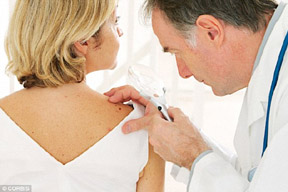 For the first time, a large study suggests that a vitamin might modestly lower the risk of the most common types of skin cancer in people with a history of these relatively harmless yet troublesome growths.
For the first time, a large study suggests that a vitamin might modestly lower the risk of the most common types of skin cancer in people with a history of these relatively harmless yet troublesome growths.
In a study in Australia, people who took a specific type of vitamin B3 for a year had a 23 percent lower rate of new skin cancers compared to others who took dummy pills. In absolute terms, it meant that vitamin takers developed fewer than two of these cancers on average versus roughly 2.5 cancers for the others.
The study did not involve melanoma, the most deadly form of skin cancer. Instead, it aimed at more common forms – basal and squamous cell cancers. More than 3 million cases are diagnosed each year in the United States.
“These are sort of the run-of-the-mill skin cancers that so many people get,” said Dr. Richard Schilsky, chief medical officer of the American Society of Clinical Oncology, an organization of cancer specialists. “They’re rarely lethal but they’re very persistent and they keep coming back,” and are expensive to remove, usually through surgery, freezing off the spots or radiation.
He and other doctors with the oncology group said the vitamin, called nicotinamide, could offer a cheap, easy way to lower risk.
However, Australia has higher rates of skin cancer than the U.S. and other parts of the world, and some doctors may want more evidence beyond this single study before recommending the pills. Vitamins have long proved elusive for cancer prevention, and some studies have even found certain ones can be harmful.
Researchers also stressed they were not suggesting vitamin use for people who have not yet had one of these cancers.
“At the moment, it’s not something for the general population,” said the study’s leader, Dr. Diona Damian of the Dermatology University of Sydney in Australia.
“We must always remember the basics of sun-sensible behaviors” – avoiding overexposure and using sunscreen – as the best ways for anyone to lower risk, she said.
The study involved 386 people who had at least two skin cancers in the previous five years. They took either 500 milligrams of the vitamin or dummy pills twice a day for a year. Neither they nor their doctors knew who got what until the study ended.
Besides reducing the rate of skin cancers, vitamin use also seemed to cut the rate of precancers – scaly patches of skin called actinic keratoses – by 11 percent after three months of use and 20 percent after nine months.
Participants were tracked for six months after they stopped taking their pills, and the rate of new skin cancers was similar in both groups.
“The benefit wears off fairly quickly,” Damian said. “You need to continue taking the tablets for them to continue to be effective.”
Nicotinamide is thought to help repair DNA in cells damaged by sun exposure. It is not the same as nicotine, the addictive stuff in tobacco. It’s also not the same as niacin and some other forms of B3, which can cause flushing, headaches and blood pressure problems. Those problems were not seen with nicotinamide in the study.
Nicotinamide is sold over the counter, is easy to take, and “there are essentially no side effects,” Schilsky said.
However, it might be a little tough to find. A check of one major drugstore chain found only other forms of B3, such as niacin, or combination B vitamins. Online, some retailers offered nicotinamide for prices ranging from a nickel to a dollar a tablet, sometimes combined with other things.
Australia’s National Health and Medical Research Council funded the study.-AP






